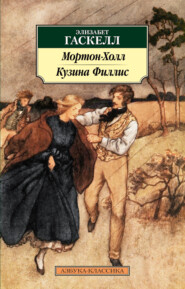По всем вопросам обращайтесь на: info@litportal.ru
(©) 2003-2024.
✖
North and South
Автор
Год написания книги
2019
Настройки чтения
Размер шрифта
Высота строк
Поля
‘Scorned, Margaret. That is rather a hard word.’
‘Perhaps it is. Only I know I should have liked to have talked to you of what I was very full at the time, and you—what must I call it, then?—spoke disrespectfully of Helstone as a mere village in a tale.’
‘I will never do so again,’ said he, warmly. They turned the corner of the walk.
‘I could almost wish, Margaret—’ he stopped and hesitated. It was so unusual for the fluent lawyer to hesitate that Margaret looked up at him, in a little state of questioning wonder; but in an instant—from what about him she could not tell—she wished herself back with her mother—her father—anywhere away from him, for she was sure he was going to say something to which she should not know what to reply. In another moment the strong pride that was in her came to conquer her sudden agitation, which she hoped he had not perceived. Of course she could answer, and answer the right thing; and it was poor and despicable of her to shrink from hearing any speech, as if she had not power to put an end to it with her high maidenly dignity.
‘Margaret,’ said he, taking her by surprise, and getting sudden possession of her hand, so that she was forced to stand still and listen, despising herself for the fluttering at her heart all the time; ‘Margaret, I wish you did not like Helstone so much—did not seem so perfectly calm and happy here. I have been hoping for these three months past to find you regretting London—and London friends, a little—enough to make you listen more kindly’ (for she was quietly, but firmly, striving to extricate her hand from his grasp) ‘to one who has not much to offer, it is true—nothing but prospects in the future—but who does love you, Margaret, almost in spite of himself. Margaret, have I startled you too much? Speak!’ For he saw her lips quivering almost as if she were going to cry. She made a strong effort to be calm; she would not speak till she had succeeded in mastering her voice, and then she said:
‘I was startled. I did not know that you cared for me in that way. I have always thought of you as a friend; and, please, I would rather go on thinking of you so. I don’t like to be spoken to as you have been doing. I cannot answer you as you want me to do, and yet I should feel so sorry if I vexed you.’
‘Margaret,’ said he, looking into her eyes, which met his with their open, straight look, expressive of the utmost good faith and reluctance to give pain.
‘Do you’—he was going to say—‘love any one else?’ But it seemed as if this question would be an insult to the pure serenity of those eyes. ‘Forgive me I have been too abrupt. I am punished. Only let me hope. Give me the poor comfort of telling me you have never seen any one whom you could—’ Again a pause. He could not end his sentence. Margaret reproached herself acutely as the cause of his distress.
‘Ah! if you had but never got this fancy into your head! It was such a pleasure to think of you as a friend.’
‘But I may hope, may I not, Margaret, that some time you will think of me as a lover? Not yet, I see—there is no hurry—but some time—’ She was silent for a minute or two, trying to discover the truth as it was in her own heart, before replying; then she said:
‘I have never thought of—you, but as a friend. I like to think of you so; but I am sure I could never think of you as anything else. Pray, let us both forget that all this’ (‘disagreeable,’ she was going to say, but stopped short) ‘conversation has taken place.’
He paused before he replied. Then, in his habitual coldness of tone, he answered:
‘Of course, as your feelings are so decided, and as this conversation has been so evidently unpleasant to you, it had better not be remembered. That is all very fine in theory, that plan of forgetting whatever is painful, but it will be somewhat difficult for me, at least, to carry it into execution.’
‘You are vexed,’ said she, sadly; ‘yet how can I help it?’
She looked so truly grieved as she said this, that he struggled for a moment with his real disappointment, and then answered more cheerfully, but still with a little hardness in his tone:
‘You should make allowances for the mortification, not only of a lover, Margaret, but of a man not given to romance in general—prudent, worldly, as some people call me—who has been carried out of his usual habits by the force of a passion—well, we will say no more of that; but in the one outlet which he has formed for the deeper and better feelings of his nature, he meets with rejection and repulse. I shall have to console myself with scorning my own folly. A struggling barrister to think of matrimony!’
Margaret could not answer this. The whole tone of it annoyed her. It seemed to touch on and call out all the points of difference which had often repelled her in him; while yet he was the pleasantest man, the most sympathising friend, the person of all others who understood her best in Harley Street. She felt a tinge of contempt mingle itself with her pain at having refused him. Her beautiful lip curled in a slight disdain. It was well that, having made the round of the garden, they came suddenly upon Mr. Hale, whose whereabouts had been quite forgotten by them. He had not yet finished the pear, which he had delicately peeled in one long strip of silver-paper thinness, and which he was enjoying in a deliberate manner. It was like the story of the eastern king, who dipped his head into a basin of water, at the magician’s command, and ere he instantly took it out went through the experience of a lifetime. Margaret felt stunned, and unable to recover her self-possession enough to join in the trivial conversation that ensued between her father and Mr. Lennox. She was grave, and little disposed to speak; full of wonder when Mr. Lennox would go, and allow her to relax into thought on the events of the last quarter of an hour. He was almost as anxious to take his departure as she was for him to leave; but a few minutes light and careless talking, carried on at whatever effort, was a sacrifice which he owed to his mortified vanity, or his self-respect. He glanced from time to time at her sad and pensive face.
‘I am not so indifferent to her as she believes,’ thought he to himself. ‘I do not give up hope.’
Before a quarter of an hour was over, he had fallen into a way of conversing with quiet sarcasm; speaking of life in London and life in the country, as if he were conscious of his second mocking self, and afraid of his own satire. Mr. Hale was puzzled. His visitor was a different man to what he had seen him before at the wedding-breakfast, and at dinner to-day; a lighter, cleverer, more worldly man, and, as such, dissonant to Mr. Hale. It was a relief to all three when Mr. Lennox said that he must go directly if he meant to catch the five o’clock train. They proceeded to the house to find Mrs. Hale, and wish her good-bye. At the last moment, Henry Lennox’s real self broke through the crust.
‘Margaret, don’t despise me; I have a heart, notwithstanding all this good-for-nothing way of talking. As a proof of it, I believe I love you more than ever—if I do not hate you—for the disdain with which you have listened to me during this last half-hour. Good-bye, Margaret—Margaret!’
CHAPTER 4 Doubts and Difficulties (#ulink_52f54918-7f59-5139-8aab-acbea0cc064e)
‘Cast me upon some naked shore,
Where I may tracke
Only the print of some sad wracke,
If thou be there, though the seas roare,
I shall no gentler calm implore.’
HABINGTON.
He was gone. The house was shut up for the evening. No more deep blue skies or crimson and amber tints. Margaret went up to dress for the early tea, finding Dixon in a pretty temper from the interruption which a visitor had naturally occasioned on a busy day. She showed it by brushing away viciously at Margaret’s hair, under pretence of being in a great hurry to go to Mrs. Hale. Yet, after all, Margaret had to wait a long time in the drawing-room before her mother came down. She sat by herself at the fire, with unlighted candles on the table behind her, thinking over the day, the happy walk, happy sketching, cheerful pleasant dinner, and the uncomfortable, miserable walk in the garden.
How different men were to women! Here was she disturbed and unhappy, because her instinct had made anything but a refusal impossible; while he, not many minutes after he had met with a rejection of what ought to have been the deepest, holiest proposal of his life, could speak as if briefs, success, and all its superficial consequences of a good house, clever and agreeable society, were the sole avowed objects of his desires. Oh dear! how she could have loved him if he had but been different, with a difference which she felt, on reflection, to be one that went low—deep down. Then she took it into her head that, after all, his lightness might be but assumed, to cover a bitterness of disappointment which would have been stamped on her own heart if she had loved and been rejected.
Her mother came into the room before this whirl of thoughts was adjusted into anything like order. Margaret had to shake off the recollections of what had been done and said through the day, and turn a sympathising listener to the account of how Dixon had complained that the ironing-blanket had been burnt again; and how Susan Lightfoot had been seen with artificial flowers in her bonnet, thereby giving evidence of a vain and giddy character. Mr. Hale sipped his tea in abstracted silence; Margaret had the responses all to herself. She wondered how her father and mother could be so forgetful, so regardless of their companion through the day, as never to mention his name. She forgot that he had not made them an offer.
After tea Mr. Hale got up, and stood with his elbow on the chimney-piece, leaning his head on his hand, musing over something, and from time to time sighing deeply. Mrs. Hale went out to consult with Dixon about some winter clothing for the poor. Margaret was preparing her mother’s worsted work, and rather shrinking from the thought of the long evening, and wishing bed-time were come that she might go over the events of the day again.
‘Margaret!’ said Mr. Hale, at last, in a sort of sudden desperate way, that made her start. ‘Is that tapestry thing of immediate consequence? I mean, can you leave it and come into my study? I want to speak to you about something very serious to us all.’
‘Very serious to us all.’ Mr. Lennox had never had the opportunity of having any private conversation with her father after her refusal, or else that would indeed be a very serious affair. In the first place, Margaret felt guilty and ashamed of having grown so much into a woman as to be thought of in marriage; and secondly, she did not know if her father might not be displeased that she had taken upon herself to decline Mr. Lennox’s proposal. But she soon felt it was not about anything, which having only lately and suddenly occurred, could have given rise to any complicated thoughts, that her father wished to speak to her. He made her take a chair by him; he stirred the fire, snuffed the candles, and sighed once or twice before he could make up his mind to say—and it came out with a jerk after all—‘Margaret! I am going to leave Helstone.’
‘Leave Helstone, papa! But why?’
Mr. Hale did not answer for a minute or two. He played with some papers on the table in a nervous and confused manner, opening his lips to speak several times, but closing them again without having the courage to utter a word. Margaret could not bear the sight of the suspense, which was even more distressing to her father than to herself.
‘But why, dear papa? Do tell me!’
He looked up at her suddenly, and then said with a slow and enforced calmness:
‘Because I must no longer be a minister in the Church of England.’
Margaret had imagined nothing less than that some of the preferments which her mother so much desired had befallen her father at last—something that would force him to leave beautiful, beloved Helstone, and perhaps compel him to go and live in some of the stately and silent Closes which Margaret had seen from time to time in cathedral towns. They were grand and imposing places, but if, to go there, it was necessary to leave Helstone as a home for ever, that would have been a sad, long, lingering pain. But nothing to the shock she received from Mr. Hale’s last speech. What could he mean? It was all the worse for being so mysterious. The aspect of piteous distress on his face, almost as imploring a merciful and kind judgement from his child, gave her a sudden sickening. Could he have become implicated in anything Frederick had done? Frederick was an outlaw. Had her father, out of a natural love for his son, connived at any—
‘Oh! what is it? do speak, papa! tell me all! Why can you no longer be a clergyman? Surely, if the bishop were told all we know about Frederick, and the hard, unjust—’
‘It is nothing about Frederick; the bishop would have nothing to do with that. It is all myself. Margaret, I will tell you about it. I will answer any questions this once, but after to-night let us never speak of it again. I can meet the consequences of my painful, miserable doubts; but it is an effort beyond me to speak of what has caused me so much suffering.’
‘Doubts, papa! Doubts as to religion?’ asked Margaret, more shocked than ever.
‘No! not doubts as to religion; not the slightest injury to that.’ He paused. Margaret sighed, as if standing on the verge of some new horror. He began again, speaking rapidly, as if to get over a set task:
‘You could not understand it all, if I told you—my anxiety, for years past, to know whether I had any right to hold my living—my efforts to quench my smouldering doubts by the authority of the Church. Oh! Margaret, how I love the holy Church from which I am to be shut out!’ He could not go on for a moment or two. Margaret could not tell what to say; it seemed to her as terribly mysterious as if her father were about to turn Mahometan.
‘I have been reading to-day of the two thousand who were ejected from their churches,’—continued Mr. Hale, smiling faintly—‘trying to steal some of their bravery; but it is of no use—no use—I cannot help feeling it acutely.’
‘But, papa, have you well considered? Oh! it seems so terrible, so shocking,’ said Margaret, suddenly bursting into tears. The once staid foundation of her home, of her idea of her beloved father, seemed reeling and rocking. What could she say? What was to be done? The sight of her distress made Mr. Hale nerve himself, in order to try and comfort her. He swallowed down the dry choking sobs which had been heaving up from his heart hitherto, and going to his bookcase he took down a volume, which he had often been reading lately, and from which he thought he had derived strength to enter upon the course in which he was now embarked.
‘Listen, dear Margaret,’ said he, putting one arm round her waist. She took his hand in hers and grasped it tight, but she could not lift up her head; nor indeed could she attend to what he read, so great was her internal agitation.
‘This is the soliloquy of one who was once a clergyman in a country parish, like me; it was written by a Mr. Oldfield, minister of Carsington, in Derbyshire, a hundred and sixty years ago, or more. His trials are over. He fought the good fight.’ These last two sentences he spoke low, as if to himself. Then he read aloud,
‘When thou canst no longer continue in thy work without dishonour to God, discredit to religion, foregoing thy integrity, wounding conscience, spoiling thy peace, and hazarding the loss of thy salvation; in a word, when the conditions upon which thou must continue (if thou wilt continue) in thy employments are sinful, and unwarranted by the word of God, thou mayest, yea, thou must believe that God will turn thy very silence, suspension, deprivation, and laying aside, to His glory, and the advancement of the Gospel’s interest. When God will not use thee in one kind, yet He will in another. A soul that desires to serve and honour Him shall never want opportunity to do it; nor must thou so limit the Holy One of Israel as to think He hath but one way in which He can glorify Himself by thee. He can do it by thy silence as well as by thy preaching; thy laying aside as well as thy continuance in thy work. It is not pretence of doing God the greatest service, or performing the weightiest duty, that will excuse the least sin, though that sin capacitated or gave us the opportunity for doing that duty. Thou wilt have little thanks, O my soul! if, when thou art charged with corrupting God’s worship, falsifying thy vows, thou pretendest a necessity for it in order to a continuance in the ministry. As he read this, and glanced at much more which he did not read, he gained resolution for himself, and felt as if he too could be brave and firm in doing what he believed to be right; but as he ceased he heard Margaret’s low convulsive sob; and his courage sank down under the keen sense of suffering.
‘Margaret, dear!’ said he, drawing her closer, ‘think of the early martyrs; think of the thousands who have suffered.’

















